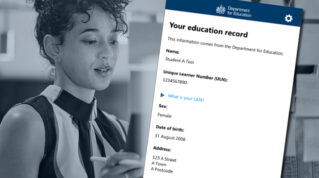England’s largest exam board has set out a timetable to move some of its exams on-screen – with a large-entry subject like English going digital by 2030.
AQA today published proposals that include parts of GCSE Italian and Polish to be assessed digitally by 2026, currently sat by around 10,000 pupils.
More subjects will follow until bigger subjects are partly digitally assessed in 2030 – meaning hundreds of thousands of simultaneous exams.
Students’ devices would be offline in the exam hall so they won’t be able to search for information on the internet or access artificial intelligence tools.
The exam board will now consult the sector before announcing more detailed plans in 2024. However proposals will also need regulatory approval from Ofqual.

Colin Hughes, AQA’s chief executive, said: “Technology and change are two constants in education… Moving to digital exams is the next step of this evolution.”
AQA said that while some boards currently use on-screen tests for a small number of subjects, such as computer science, this is the first time any board has said out a timetable for moving a high volume GCSE subject digital test.
The board has also today launched an online demo of its digital exams.
‘Quicker to type answers’
In 2025, AQA will launch its first digital mock exams for the GCSE Italian and Polish reading and listening components before they move to live exams the following year.
The exams will take a “paper behind glass approach”, meaning the existing exam paper will be replicated on-screen. But in the longer term, there is “much potential for more innovative and interactive assessment”.
AQA said it doesn’t want to “overburden” schools so chose two subjects with an average cohort size of four. This year, 7,000 students sat the board’s Polish exam, with 3,000 for Italian.
A pilot of digital science exams, the findings of which have been published in the board’s “making it click: the case for digital examinations in England” report today, show 52 per cent of students were positive about their experience of taking GCSE science digitally in the pilot.
A further 36 per cent felt neutral while 12 per cent felt negative.

Positive experiences were higher for GCSE computer science, at 77 per cent, with 19 per cent feeling neutral and less than four per cent feeling negative.
Middle class pupils were more likely to say they prefer pen and paper (24 per cent) compared to working class pupils (19 per cent).
Sixty-three per cent of young people felt comfortable using a computer for longer than an hour, whereas only 36 per cent felt comfortable using a pen and paper for that time.
Students were also glad to not have to worry about handwriting legibility, AQA said.
AQA-commissioned research also found an estimated 9 per cent reduction in carbon emissions per exam.
‘Legitimate concerns’
But there are challenges and “legitimate concerns” on moving to digital exams.
One of the “clearest” issues is digital infrastructure, with 79 per cent of teachers saying that is something they would need, followed by typing training and more time using technology in classrooms.
Most teachers and school leaders surveyed felt five years (33 per cent) would be a suitable timeframe for implementation.
While those surveyed felt digital exams could help students with special educational needs and disabilities, there were concerns disadvantaged students may be negatively impacted because of lack of technology at home, for instance.
The board said further research is required to determine how digital exams may impact the attainment gap. AQA will also monitor other countries to learn from their practices.

Some students in the pilot reported difficulties “when faced with the unfamiliar layout of a digital exam paper” which could “be a very disconcerting experience in a high stakes exam setting”.
The board said it wants to “reassure the sector that we will be moving forward in a measured, sensible way and that we will provide teachers and candidates with as much detail as we can as early as we can”.
Ofqual and the Department for Education are currently undertaking a feasibility study on “what it would take” to make GCSEs and A-level exams “fully digital”.
However the regulator has ruled out allowing robots taking over the marking of students’ work.
A spokesperson said handwritten responses will “remain an essential part of regulated qualifications for the foreseeable future”.
The regulator’s scrutiny of AQA’s plans will “include a review of issues such as how the awarding organisation will prevent malpractice, ensure fairness and that the qualification will secure valid grades for students”.
















Your thoughts